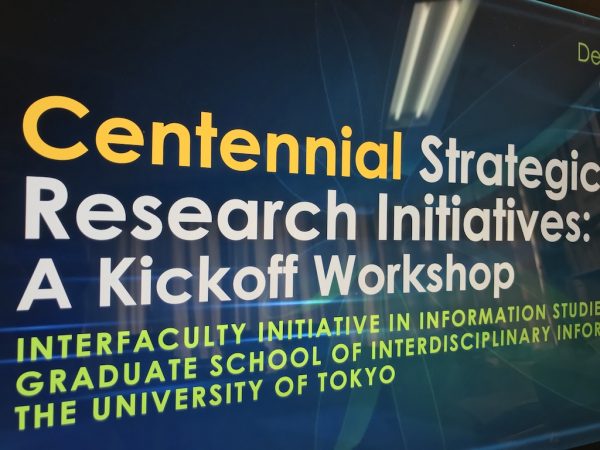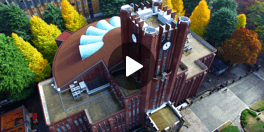
May 20, 2021
「センテニアル戦略研究イニシアティブス−−キックオフ・ワークショップ」開催報告Centennial Strategic Research Initiatives: A Kickoff Workshop
学環・学府20周年を迎えた2020年の仕事納めの12月28日(月)に、新年を迎えるにあたり、さらに長期的な視点で、将来の研究活動のあり方を戦略的に考えるために、本ワークショップがオンラインで開催されました。
本学の歴史を改めて振り返りますと、そのルーツは貞享元年12月(1685年1月)の天文方にまで遡り、そうした悠久の時の流れの中で、学環・学府は、さまざまな関係組織からの唯一無二の貴重な貢献により創設され、不断の改革と発展を進めてきました。
本ワークショップは、この数百年にわたる長期のスパンで先進的に育まれてきた学際的連携の志を受け継ぎ、特に「研究」に焦点を当てて、学環・学府の教員自身の研究テーマ・内容とその楽しさ・面白さをお互いに共有するとともに、コラボレーションの進め方を議論する場として企画されました。本企画の名称に、長期的な視点を象徴する切りのよい”centennial”を冠しつつ、”initiatives”と複数形になっているように、今後、さまざまな興味関心に基づく複数のイニシアティブが、わいわいと賑やかに重なり、お互いのルーツやオリジンを大切にしながら、ゆるやかに連携して、学環・学府20周年の次の25周年(Quadranscentennial)・30周年(Trigentennial)・40周年(Quadragennial)等、そして、さまざまな関係組織も含む次の100周年・200周年(Bicentennial)・300周年(Tricentennial)・400周年(Quadricentennial)等へと、多彩で実り豊かにつながっていくことを志しています。
このたびのキックオフにあたり、前半の「ディスカッション」の部では、今後の学際的なコラボレーションの進め方のみならず、連携を可視化する成果の出し方についても、意見交換を行いました。例えば、それぞれの専門分野で重視される研究成果や実績は何か、評価のものさしをどのようにして明示化しうるか、学生をはじめとする若い世代の方々が研究の最前面で活躍するためには従来の枠を超えて何ができるか等について、アイデアや智慧を出し合いました。また、学府の副指導教員制度が研究の連携促進の観点からも活用されている事例、オンラインでの連携を進めるツールなども、次々と紹介されました。
後半の「研究発表」の部では、3名の教員から以下のタイトルで、日本語または英語でプレゼンテーションが行われました。また、当日の発表内容のなかでも、今後の連携を進める上でのポイントを以下に掲げます。
1. 目黒 公郎 教授「総合的な災害マネジメントの立案と実践:有限な資源の効率的活用の視点から」
効果的な災害対策の立案と実践には、社会の幅広い層の人々との連携が不可欠となるという洞察に基づき、専門分野での論文発表等に加えて、100近い国々を訪問してそれぞれの現場のニーズに寄り添った災害対策の仕組みを立ち上げる実践活動を展開。組織の活動を可視化して、リソース配分等を戦略的に考えるための方法論も紹介。
2. 渡邉 英徳 教授「記憶の解凍」
デジタルアース・マッピングシステム、AI技術を用いたモノクロ写真のカラー化などの「表現技術」を起点にして、さまざまなコラボレーションが生まれること。とりわけ、高校生・大学生を含む若手たちから「創発」するアイデア・実践を、年長者が育んでいくことの重要さが述べられました。
3. Professor Itsuko Yamaguchi, “Algorithmatizing Fairness against Algorithmic Bias: Centennial Perspectives on the Future of AI-driven Global Data Governance”
After having pointed out inherent difficulties in quantifying “fairness” to fix the “bias” problem in black-box proprietary algorithms, we need a renewed centennial commitment to interdisciplinary and independent research collaboration in order to define what we value, to make policy choices explicitly, and to codify them proactively into various decision-making and governance systems including AI, in such a way as to be “meaningfully” accessible, understandable, verifiable, and contestable by all.
当初の2時間の予定を大幅に超過して行われた今回のワークショップでの活発な議論の結果、今後も、個人の活動と組織の活動の双方にとっていわばwin-winとなる形で、ゆるやかな連携のための場を定期的に設けることになりました。次のワークショップでは、「コラボレーションのデザイン」をテーマにして、厳密な意味での「研究発表」に限らず、より広い意味での学環・学府内外での連携の環のアイデアや実践活動について、お互いに共有して議論を重ねて、上掲のとおり、学環・学府20周年の次の25周年・30周年・40周年等、そして、さまざまな関係組織も含む次の100周年・200周年・300周年・400周年等へとつながるように、多彩で実り豊かな学際的連携の成果を生み出していくことを目指しています。
記事:山口いつ子(教授・企画責任者)
On December 28th 2020, which was the last working day before the New Year Holiday in the centennial year of the III/GSII, a workshop was held to develop strategic thinking about the future of research in this organization.
The roots of the University of Tokyo can be traced as far back as the year 1685. The III/GSII came into existence against the backdrop of this long history, thanks to the unique and precious efforts of people in numerous organizations, and has arrived at its present form through an ongoing process of reform.
Picking up on this long history of interdisciplinary collaboration, the workshop was designed as an occasion for faculty members to share the contents and appeal of their own research topics and to stimulate discussion on how to further advance interdisciplinary collaboration in the future. As indicated in its title, this workshop sought to bring together multiple research initiatives in a diverse and highly productive strategic alliance while also recognizing and celebrating their different origins and unique appeal. It took a longer term perspective looking forward to the many future milestones that are still to come, such as the quadranscentennial in another 25 years, the trigentennial 30 years from now, the quadragennial 40 years hence, or even looking another 100 or more years into the future to the bicentennial, tricentennial or quadricentennial.
In the first “Discussion” section of the workshop, we exchanged opinions on how to advance interdisciplinary collaboration and how to make such collaboration visible in the publication of the results. Ideas and wisdom were exchanged on how research results are evaluated in different fields of research, how evaluation criteria can be made more explicit, and how existing frameworks can be exceeded to encourage especially younger researchers and students to become active on research frontiers. Through this discussion, we learned of instances where the subsidiary-advisor system of the GSII has contributed to research collaboration and how online tools have been used to promote collaboration, among many other instructive cases.
The second half of the workshop was devoted to individual research presentations by three faculty members (delivered in Japanese or English). Their respective titles and a summary of their relation to the topic of research collaboration is given below.
1. Professor Kimiro Meguro, “Planning and Practice for Integrated Disaster Management: from the Perspective of Efficient Usage of Limited Resources”
Effective disaster management planning and practice require the cooperation of people from multiple sectors of society. Based on this insight, in addition to publishing papers in specialized fields, I have visited nearly one hundred countries to develop interventions initiating systems for disaster countermeasures close to the needs of local residents. I also introduced methodologies for making organizations’ activities visible and thinking strategically about resource distribution.
2. Professor Hidenori Watanave, “Rebooting Memories”
Various collaborations have come about through “expressive technologies” such as the use of digital earth mapping systems and the application of artificial intelligence for the colorization of monochrome photographs. It is particularly important for innovative ideas and practices initiated by young people (including high-school and university students) to be developed by those with more experience.
3. Professor Itsuko Yamaguchi, “Algorithmatizing Fairness against Algorithmic Bias: Centennial Perspectives on the Future of AI-driven Global Data Governance”
After having pointed out inherent difficulties in quantifying “fairness” to fix the “bias” problem in black-box proprietary algorithms, we need a renewed centennial commitment to interdisciplinary and independent research collaboration in order to define what we value, to make policy choices explicitly, and to codify them proactively into various decision-making and governance systems including AI, in such a way as to be “meaningfully” accessible, understandable, verifiable, and contestable by all.
The workshop continued for much longer than its originally allotted two hours. It was therefore decided to hold such workshops periodically in the future, creating a win-win situation for both our individual research and the activities of the organization as a whole. In the next workshop, to be held on the topic of “Collaboration Design”, we plan to deepen our discussions and share ideas and practical experience for the expansion of collaborative work in the III/GSII, rather than being limited to “research presentations” in the traditional sense. In this way, our aim is to bring together multiple research initiatives in a diverse and highly productive strategic alliance for the future.
Text:Itsuko Yamaguchi (Professor, Workshop Organizer)
English translation:David C. Buist (Senior project specialist)
